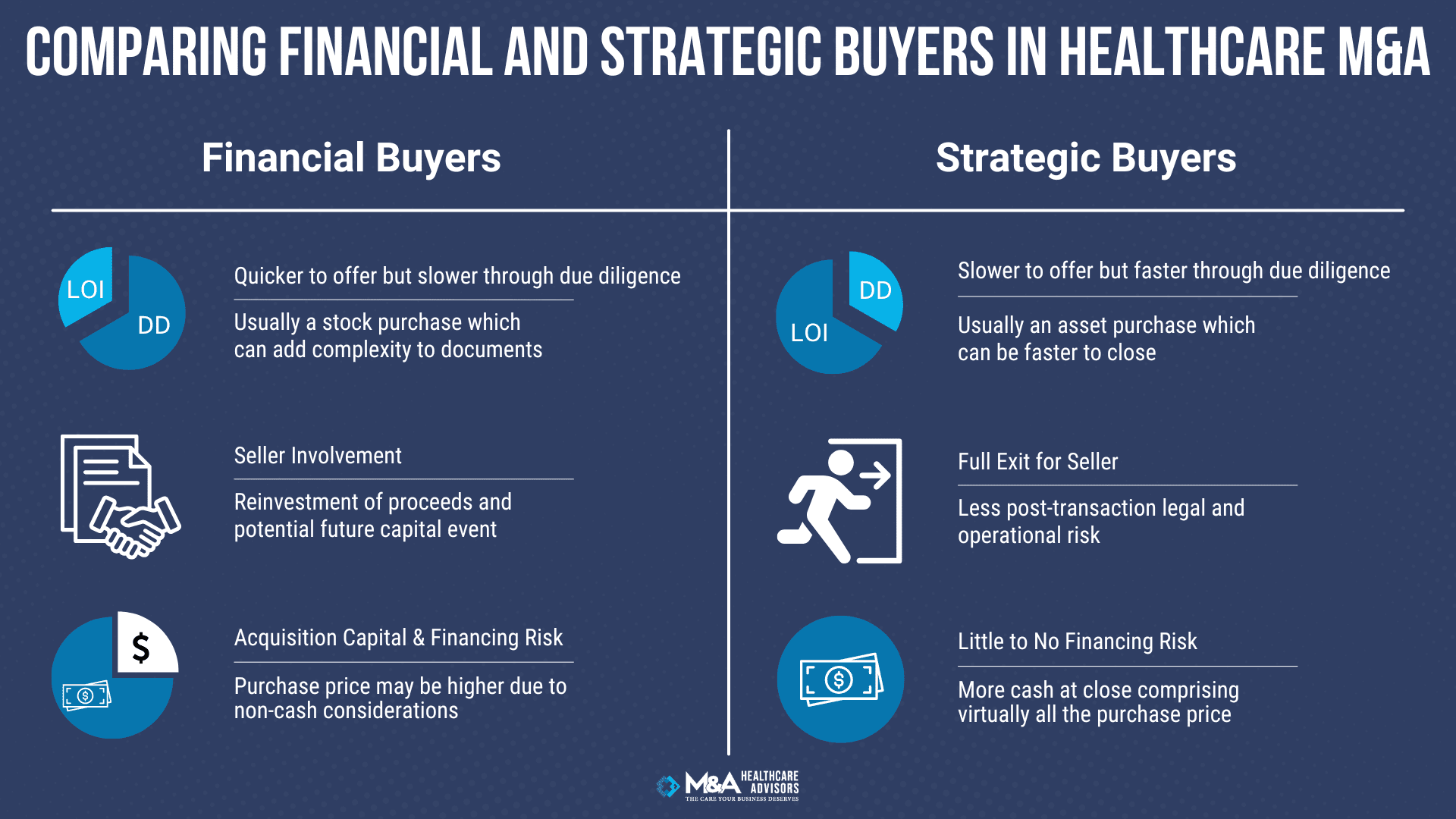Executive Summary
When selling your healthcare business, it is crucial to understand the types of buyers that may have interest in acquiring your business so that you can set realistic expectations and properly prepare for negotiations. Buyers typically fall into three types: Strategic, Financial, and Independent. Each buyer type has different motivations, timelines, and approaches to purchasing, which can significantly impact the sale process. This article explores these types of buyers, providing insights into what they seek and how they may approach buying your healthcare business.
Identifying the Right Buyers for Your Healthcare Business
The types of buyers that approach your business can determine the structure of the deal, the speed of the process, and your post-sale role. Understanding the characteristics and objectives of Strategic, Financial, and Independent buyers helps you better navigate the M&A landscape and align with the right partners.

Strategic Buyers: Focusing on Market Share and Synergies
Strategic buyers are typically larger corporations or organizations that offer similar services to your healthcare business. Their primary interest lies in increasing their market share and leveraging synergies to enhance their existing operations. Here's how Strategic buyers operate:
- Speed to Deal: Strategic buyers often move cautiously when it comes to submitting a Letter of Interest (LOI). However, once they decide to move forward, they tend to complete due diligence and enter into a purchase agreement more quickly than other buyer types.
- Focus on Synergies: These types of buyers look for opportunities to consolidate your business’s operations—such as marketing, administration, and general functions (SG&A)—into their existing framework. This consolidation often leads to cost reductions and increased efficiency, making your business more valuable to them.
- Profitability vs. Market Share: Unlike other buyers, Strategic buyers may prioritize expanding their market presence over immediate profitability. Their focus is often on long-term growth and capturing a larger share of the market.
- Offer Characteristics for Strategics:
- Generally an Asset Purchase with shortened disclosure schedule
- Lower Price Consideration, but More Cash-at-Close
- Less Post-transactional Risk
- Little to No Seller involvement through transition.
Strategic buyers are typically a good fit for healthcare businesses that offer complementary services or products, allowing them to enhance their market offering or enter new markets seamlessly.
Financial Buyers: Driven by Return on Investment
Financial buyers, often Private Equity firms, Independent Sponsors, or Family Offices, are primarily focused on achieving a significant return on investment for themselves (General Partners) and their investors (Limited Partners). These types of buyers are interested in acquiring businesses that they can grow and eventually sell at a higher value. Key aspects of Financial buyers include:
- Quick Offers, Slow Diligence: Financial buyers are generally quick to put together an initial offer. However, they may take longer to conduct due diligence and finalize definitive agreements, as they carefully assess the potential for return on investment.
- Arbitrage Model: These buyers often employ an arbitrage strategy—buying businesses at a lower value, building them up, and then selling them for a profit. This model is particularly appealing for healthcare businesses generating over $2 million in EBITDA, where there is significant potential for growth.
- Seller Involvement: Financial buyers often prefer sellers who wish to remain involved in the business post-sale. This allows the seller to benefit from the future growth of the company while also securing a portion of the business’s value upfront.
- Offer Characteristics for Financial Buyers:
- Generally propose a stock purchase with robust disclosure schedule
- Higher price consideration, but less cash-at-close
- More post-transactional risk
- Seller will be involved through transition, and maybe future operations
Financial buyers are ideal for business owners looking to continue playing a role in the growth of their company while also realizing some immediate financial gain.
Independent Buyers: A Diverse Group with Strategic Intentions
Independent buyers are a sub-category of Strategic buyers that includes modestly sized organizations that don’t fit exactly into the Strategic buyer mold but utilize similar principals. These types of buyers are often individuals or smaller entities looking to transition into business ownership or integrate your business into another healthcare platform. Here’s what you need to know about Independent buyers:
- Strategic Approach with a Smaller Scale: Independent buyers often act similarly to Strategic buyers but on a smaller scale. They may be interested in acquiring your business as their primary operation or integrating it into their existing, mid-size healthcare offerings.
- Transition to Ownership: Some Independent buyers are strategic senior managers or executives looking to transition from operational roles into equity ownership. Similarly, there are “search funds,” which may be backed like a lower-middle-market financial firm, but lead by an operator who will take-over as CEO once the company is acquired. These buyers are often more hands-on and may seek to run the business themselves, limiting seller’s post transactional involvement.
- Best for Smaller Companies: Independent buyers are typically a good match for smaller healthcare businesses that may not attract large Strategic or Financial buyers but can still drive a competitive transaction structure and price in the market.
- Offer Characteristics for Independent Buyers:
- May be either an Asset or Stock Purchase
- Higher price consideration and substantial cash-at-close
- Post-transactional risk will fall somewhere between Strategic and Financial firms
- Seller will be involved through transition, but more as an advisor than a manager
Independent buyers provide an option for business owners who are selling smaller companies and are looking for a buyer with a personal interest in the industry. These types of buyers may provide a “best of both worlds” option to sellers, but they need to be thoroughly vetted given the slightly higher risk of not reaching a closed transaction.
Matching Your Healthcare Business with the Right Buyer
The types of buyers you attract can significantly impact the sale process and the future of your healthcare business. Whether it's a Strategic buyer looking to expand their market share, a Financial buyer focused on investment returns, or an Independent buyer aiming for ownership, understanding these profiles helps you prepare for a successful sale. M&A Healthcare Advisors are here to guide you through this process, ensuring you find the right match for your business.
Ready to Learn More?
M&A Healthcare Advisors is here to guide you, throughout the selling process.




